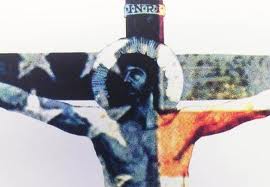![]() Is there any reason to believe that Jesus would want you to vote?
Is there any reason to believe that Jesus would want you to vote?
This seems to be the critical question that American Christians have overlooked. The conversation has primarily been based on the belief that Jesus would vote, and he would either vote democratic or republican. But is this based in theology or patriotic tradition?
Jesus taught that his followers should subvert the military of their government by going above and beyond when the military enforced labor on them. His primary sparring partners were Pharisees, Sadducees and the Sanhedrin whose offices were often both religious and political. He referred to King Herod as a fox. He questioned the authority of Pilate, and thereby, the Roman government.
For the next ten month the news, air waves, and social media feeds are going to be focused on the Presidential election. Both sides will do everything they can to garner the affection of segments of the population, especially those with religious affiliation. Conversations will take place at work, at bars, coffee shops and on-line. People will expect you to pick a side.
The most important thing Christians can do this election year is decide what they trust in: is it the powers of government? Business? Media? Military? Themselves? Or is it in the kingdom of God?
And if the power is in the kingdom of God, how does that effect how we will live for the next 10 months?










 Tweets
Tweets